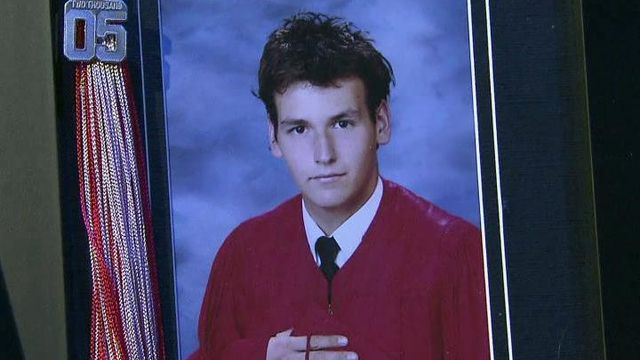Mother of teen suicide victim: Parents think, 'My kid won't do that'
Every year, more than 1,000 North Carolinians commit suicide, and about 5 percent of those are under the age of 20. Children often show signs they're struggling, but experts say many family and friends don't recognize the signals.
Posted — Updated“Parents have got to be in touch with their kids,” Zahnow said. “They just push them aside. They say, ‘Oh, you're a teenager. You'll be alright.’ You have to pretend they're little kids still. They need you.”
Looking back, Zahnow says she realizes her son began a downward spiral of depression and drugs around age 15, just after his father died from melanoma.
He started having trouble in school and went to rehab several times. One of the key signs she discovered after Cameron’s death was a journal filled with suicidal poetry and disturbing pictures, as well as a suicidal blog.
“You could read in the journal all his paranoid thoughts. It was really kind of scary,” she said.
“(Parents) all have these blinders on, ‘Oh, my kid won’t do that,’” Zahnow said. “Over and over, I hear parents who have lost teens say, ‘If only I’d seen the signs.’”
Zahnow says, although she missed some signs her son was struggling, she feels she did everything she could for him at the time, including sending him to several doctors and therapists.
“You just can't save all them. Some people are just determined to die,” she said.
Jane Miller, director of the North Carolina Suicide Prevention program, says today’s fast-paced society has contributed to the stress young people feel. Children dealing with crises can often be prone to suicidal thoughts, she said.
“Worthlessness, loneliness, you'll see individuals isolate from others,” she said.
Miller says the state's research has shown the number one way to prevent youth suicide is parent and community involvement in their lives. Parents should not be judgmental or offer advice – just listen.
“(Try) to set aside a time just between you and your child to discuss what's going on in their lives,” she said.
“For every suicide, there are at least six individuals that are profoundly affected,” Miller said.
Hayley McHugh, a 10th-grader at Wake Forest-Rolesville High School, says she knows what can happen when teens spiral downward. She lost a friend to suicide last year and has had several other friends try to kill themselves.
“I think I blame myself for it a little bit. If I'd stayed friends with him, I could have done something,” she said. “It will always be with me. It's not something that you can just have that process of grief and just get over it an accept it. It will always be with you, no matter what.”
“There (are) more drugs and more problems. Our generation is pretty much diseased,” she said. “We're so deep in the hole that we can't make it better.”
Bullying often plays a role in teen depression and suicide, especially name-calling, according to Hayley.
“It not only makes them question themselves, but question humanity and what they're doing and how their life is,” she said.
Experts who work in the suicide prevention field say one of the biggest issues they face is the unwillingness of parents and school leaders to talk about suicide with children. Some believe talking about suicide puts the idea in a young person’s mind, which health experts say is false.
Hayley reiterates the message that communication is key. She says most teenagers strive to make their parents proud.
“Acknowledge them in what they do, that they are good enough,” she said. “Just listen to them. That's what I think they really need.”
• Credits
Copyright 2024 by Capitol Broadcasting Company. All rights reserved. This material may not be published, broadcast, rewritten or redistributed.





